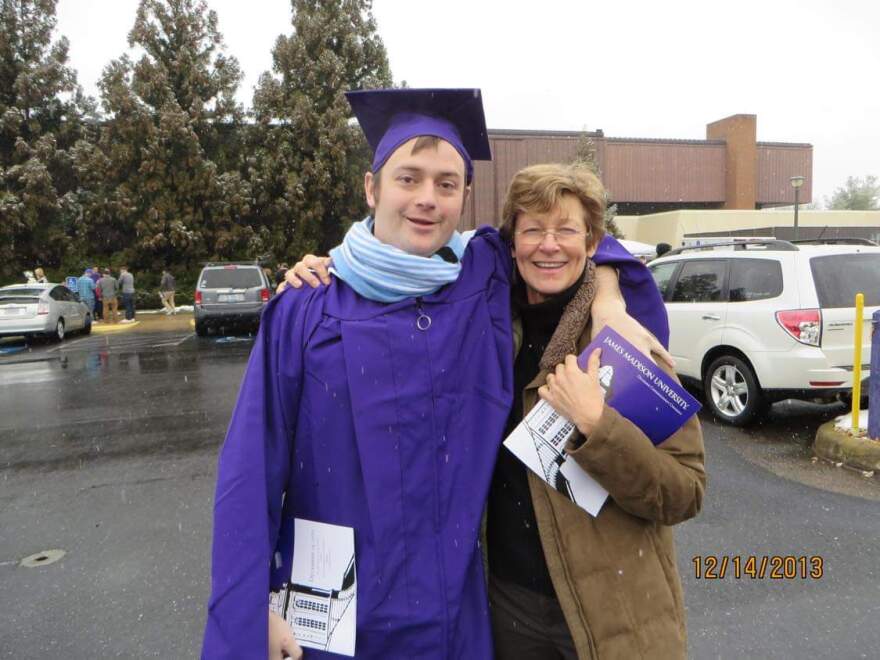With the exception of one privately owned prison in Brunswick County, Virginia's prisons are owned by the state, and local and regional jails are owned by cities and counties. But there are still entities that profit from incarceration: the private companies that provide services to inmates. WMRA's Randi B. Hagi reports.
This is Part 1 of a two-part report.
WMRA made open records requests to seven jails and four Department of Corrections facilities in the area for their contracts with private companies, such as those that provide telecommunications, commissaries, healthcare, and food services. Several giants emerged from this pile of documents, including communications companies Global Tel*Link, JPay, and Pay Tel that work in correctional facilities nationwide.
The costs of these services can take a serious toll on the family members of inmates. Raven Black has a daughter in Middle River Regional Jail in Staunton.
RAVEN BLACK: It's financially devastating, but what are you going to do when you see your child or your loved one in there? And you've got to talk to them. It costs me $125 a month usually to talk to her one time a night.
The phones at Middle River are run by Global Tel*Link, also known as GTL, which is based in Falls Church. In addition to the rates of phone calls -- part of which gets kicked back to the facility as a commission -- there are fees to access the service.
BLACK: Out of $25, they charge me like $3.81 to put the money on the phone. And then for 20 minutes, a phone call is 13 cents a minute, and then they charge another tax each time on top of that.
Another mom, Deborah Turner, described these fees as --

DEBORAH TURNER: It's a tax on the most impoverished part of our population.
Her son was initially incarcerated at Middle River, and is now at Lunenburg Correctional Center in southside Virginia.
TURNER: The rates, and I didn't realize until I sat down and did some work last night, but if you put $10 to $20 on their commissary, they, JPay takes 30%. That's the fee … and if you put as much as $300, which is the limit, it drops to 5%. So it's a tax on the ones who can afford it the least.
A representative of JPay wrote in an email [quote] "We work closely with VADOC (the Virginia Department of Corrections) and all agency customers to ensure our products and services are affordable and accessible. The costs are set by the DOC and all fees are displayed on our website and mobile app. JPay pays VADOC a 5% commission on premium media purchases and stamp purchases." [end quote]
Another telecommunications company that operates in the Shenandoah Valley is Pay Tel, based in Greensboro, North Carolina. It has contracts with Rockbridge Regional Jail, RSW Regional Jail in Front Royal, Rockingham Harrisonburg Regional Jail, and the Page County Jail. The terms of these contracts vary -- at RSW, phone calls cost 15 cents a minute, 63% of which goes back to the jail. In Page County, the jail gets a 50% cut, and at Rockingham Harrisonburg, the jail gets 20% on local calls.
After WMRA asked Pay Tel for an interview about their rates and how they're determined, the company responded with a written statement saying that they have advocated for reasonable calling rates and are, [quote] "an active participant in FCC regulatory proceedings related to this important subject." [end quote]
Also critical to life behind bars is the commissary -- where an inmate can buy food and personal items including hygiene products and clothing.
TURNER: All of this has to be paid for by the families, and it's often highly marked up and of the poorest quality. My son's tennis shoes -- he wears them out every three months because they're such poor quality. He says they're not even as good as the ones that you might get at Walmart, and they're $40.
Another mother who spoke with WMRA, Laura Payne, says she’s put more than $2,000 on her son's commissary account since he arrived at Middle River in May. She's paid $288 in fees on those deposits.
The food available to their kids was a big issue for all four mothers who spoke with us. Melissa Lafferty, who works in healthcare in Harrisonburg, has a son at Augusta Correctional Center in Craigsville. She brought up the commissary.

MELISSA LAFFERTY: You know, that costs two to three times what it would cost someone on the street. In order for them to get any kind of vitamins, things like that, that's all limited. But I think vitamins are extremely important because my son does not get fresh fruit or vegetables. He gets processed food that is killing him.
She said she's blessed to be able to afford the commissary prices, the phone calls, all the fees and a new tablet for video visits, but she encounters other families on visitation days who are really strained by the expenses.
LAFFERTY: As a, you know, a citizen, or just an adult, a human, a taxpayer, a healthcare provider -- I would have never known what a broken system we have unless I had been thrown into this. And now I realize, oh my, we have a broken, broken system that takes advantage of the already vulnerable, the already poor.
Keefe Supply Company provides commissary services to all DOC facilities and Middle River. Neither they nor another commissary company, Oasis Management Systems, responded to an interview request.



